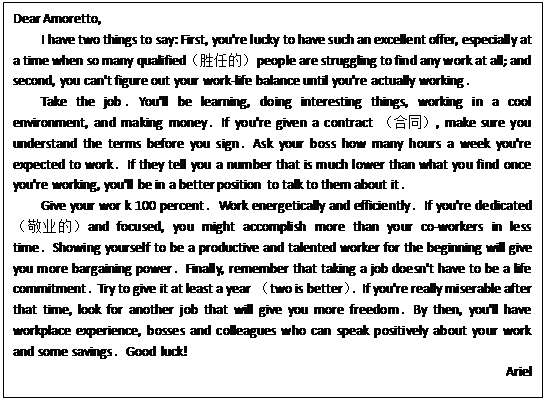题目内容
________ at least a score of buildings will be built soon.
- A.It hopes
- B.It is hoped that
- C.We are hoped
- D.It is wished that
hope只可接单宾语,故排除C项。It is hoped that…意为“人们希望……”。

Learning experiences happen to us throughout our lives. Not long ago, I had one that I would like to 16 .
I was going to Marblehead with my sailboat team. The team was racing down the highway at 85 mph 17 we realized we were 18 . Luckily, we saw a rest area ahead. I had a brand new $20 bill. I was so 19 because I had never had that kind of cash before. But spending it on 20 seemed like throwing it away. We all rushed into the pizza line. 21 I got a pizza and a drink, and walked to my table. About half way through the meal, I 22 I had not actually handed any money to the cashier. I had just 23 out, and nobody had noticed, I felt terrible.
My conscience( 良心) opened its mouth and swallowed me in one big bite. I couldn’t 24 over it. I just couldn’t go back to the cashier and 25 for my stolen pizza. I was so upset that I 26 to give myself the pleasure of an ice-cream for 27 that someone would say, “ Hey, Jeff, why don’t you use the change 28 the pizza instead of that nice, new $20 bill?” I was not so 29 of my cash now.
For the next two years, whenever I was 30 of the “pizza incident”, I would say to myself, “ Don’t think about it...”
I have learned two things from this 31 . Maybe I was a fool for 32 in to my conscience, and being too stupid to appreciate a 33 pizza. But the real lesson is that even if you get away from what you have done, your conscience 34 up with you.
This reflect the saying, “ A coward(懦夫) dies a thousand deaths; a hero dies one.” I was a coward and have felt terrible about that incident at least a thousand times. If I had been a “ 35 ” and gone back to pay for the pizza, I would have felt a little uncomfortable about it only once, or maybe twice.
| ||||||
| ||||||
| ||||||
| ||||||
| ||||||
| ||||||
| ||||||
| ||||||
| ||||||
| ||||||
| ||||||
| ||||||
| ||||||
| ||||||
| ||||||
| ||||||
| ||||||
| ||||||
| ||||||
|
Here are two letters in WORKWORRIES, a column(栏) in a newspaper:

【小题1】From Amoretto's letter, we know that he __________.
| A.has been working for a long time | B.is likely a green hand |
| C.expects to change his job | D.is quite satisfied with the job. |
| A.By taking a training course. | B.By asking people for advice. |
| C.By comparing with others. | D.Through his own work experience |
| A.understanding the terms before signing |
| B.working hard and efficiently |
| C.getting a better position |
| D.doing the job at least a year |
| A.Take the job offered. | B.Give up and find a new job. |
| C.Depend on your feeling. | D.Choose jobs with great care |
Homework can put you in a bad mood (心情), and that might actually be a good thing. Researchers from the University of Plymouth in England doubted whether mood might affect the way kids learn. To find out the answer, they did two experiments with children.
The first experiment tested 30 kids. Some shapes (图片) were hidden inside a different, larger picture. The kids had to find the small shapes while sitting in a room with either cheerful or sad music playing in the background. To test their mood, the scientists asked the kids to point to one of five faces, from happy to sad. Children who listened to cheerful music tended to point to the smiley faces while the others pointed to the unhappy ones. The researchers found that sad kids took at least a second less to find the small shapes. They also found an average of three or four more shapes.
In the second experiment, 61 children watched one of two scenes from a film. One scene was happy, and the other was sad. Just like in the first experiment, kids who saw the sad scene acted better compared to the others.
The researchers guessed that feeling down makes people more likely to focus on a problem or difficult situation. Not all scientists agree with them, however. Other studies argued that maybe, that cheerful music in the first experiment distracted (使分心) kids from finding shapes.
While scientists work on finding out the answers, it still might be wise to choose when to do your tasks according to your mood. After eating a delicious ice cream, for example, write an essay.
【小题1】Researchers did experiments on kids in order to find out ______.
| A.how they really feel when they are learning |
| B.whether mood affects their learning ability |
| C.what methods are easy for kids to learn |
| D.the relationship between sadness and happiness |
| A.kids who listened to happy music turned out to be energetic |
| B.kids who listened to sad music liked to choose smiley faces |
| C.kids worked harder in the background of happy music |
| D.sad music helped kids find out small shapes quickly |
| A.The researchers will continue to do experiments. |
| B.The researchers have found a clear answer. |
| C.The experiments are popular among kids. |
| D.Kids change their feelings more easily. |
| A.a science survey | B.a research report |
| C.a school project | D.an introduction to an experiment |